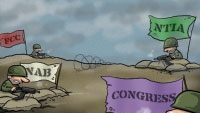The blame game
The professional video industry's #1 source for news, trends and product and tech information. Sign up below.
You are now subscribed
Your newsletter sign-up was successful

What could have been a relatively smooth transition to digital television is turning into an all-out political war. The recent movie title, “There Will Be Blood,” might best describe what is starting to happen.
In early January, FCC chairman Kevin Martin reminded everyone that no matter what industry issues might arise, Feb. 17, 2009, was going be a hard deadline because, “We get to reclaim that spectrum.” In other words, Congress wants that money, so shut up and play ball.
By mid-January, Democrats John Dingell and Ed Markey began building a protective firewall for themselves and colleagues by announcing that DTV transition hearings would begin Feb. 13. “With just a year to go, we want this transition to be as smooth as possible for American consumers,” Markey said.
In response to President George W. Bush's request to blow another $20 million on the FCC's DTV education program, Dingell moaned, “I'm concerned about the size of the increase. When added to the original $5 million that was allotted by the Republican Congress that enacted this program, this is far too little to educate a nation of 300 million people. We should not be attempting this transition on the cheap.” Translation: “Don't blame Congress if this doesn't work. We held hearings.”
In this bitter climate of political debate, it's also not surprising Dingell saddles a “Republican Congress” with the responsibility for the program.
By early March, FCC commissioner Michael Copps was screaming about the sky falling and comparing the digital transition to a Broadway play. What? The truth is, he's positioning so he can say, “I told you this wouldn't work, so now make me FCC chairman” with a future Democrat White House.
About the time the STBs were to arrive on store shelves, the Community Broadcasters Association (CBA) began whining because some of the STBs do not provide for analog signal pass through. In other words, the association's lower power (analog) stations won't be receivable on these boxes.
The professional video industry's #1 source for news, trends and product and tech information. Sign up below.
A collective, “Oh, my gosh! How could that happen?” with a sly wink, wink, could be heard and seen from the NAB and MSTV.
The CBA's vice president of technology, Greg Herman, said, “Distribution of the boxes, in our opinion, may well be illegal.” Oh boy, call out the lawyers.
Another example of key people ducking for cover was the unexpected departure of NTIA's point person on the whole converter box program, Meredith Baker. Because she's held the job only since last November, you have to wonder if she knows something's up and wants to be long gone when it happens.
But don't worry. Our fearless FCC chairman has developed a solution. On Feb. 12, Martin issued a request for industry-wide cooperation to help LPTV stations reach their viewers.
He's decided DTV stations should voluntarily partner and carry the signals of their local LPTV stations on one of their digital multiplex channels. He was kind enough to say that full-power stations could be reimbursed for their costs of carriage.
So, the blame game has begun. Congress has held hearings proclaiming that insufficient money was spent. The NTIA says the rules were clear. The FCC says full-power stations should carry the LPTV signals. The CBA says it may sue. And NAB and MSTV say, “Tisk, tisk, such a problem.”
Bureaucrats and politicians are good at only two things: spending our money and avoiding blame. The DTV converter box program may well just be the latest example.
Send comments to:editor@broadcastengineering.com
